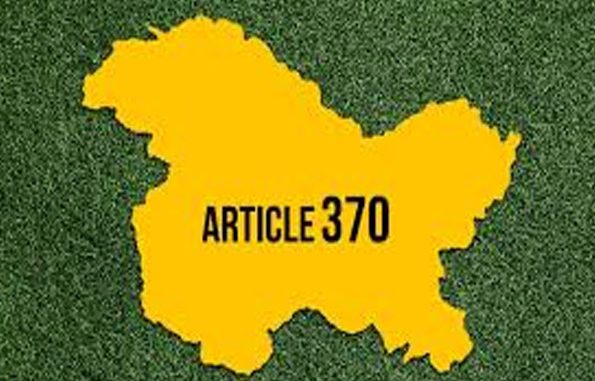
Context:
The government decision to repeal Article 370, 35A, and to make J&K and Ladakh Separate Union Territories
The Proposal:
- The Union government moved a resolution in the Rajya Sabha to repeal Article 370 in Jammu and Kashmir, removing the special status granted to the state. Also, a bill has been proposed to bifurcate the state of J&K into two Union territories – Jammu and Kashmir (with a legislature), and Ladakh (without a legislature).
Understanding Article 370:
- The state of Jammu and Kashmir became part of Indian Dominion by signing the ‘Instrument of Accession of Jammu and Kashmir to India’. Under this, the state surrendered only three subjects (defence, external affairs, and communications) to the Dominion of India.
- In pursuance of that, Article 370 was incorporated in the Constitution of India. Article 370 under Part XXI of the Indian Constitution is a “temporary provision” which grants special autonomous status to Jammu and Kashmir.
- Under Article 370, the provisions of Article 238 (dealing with the administration of Part B states) are not applicable to the state of J&K.
- Further, Article 370 limits the powers of parliament to make laws for the state to (a) only those matters in the Union List and the Concurrent List which correspond to matters specified in the state’s Instrument of Accession; (b) Such other matters in the Union List and the Concurrent List which are specified by the President with the concurrence of the state government. This means that laws can be made on these matters only with the consent of the State of J&K.
Article 35A:
- Article-35A had been inserted via the Constitution (Application to J&K) Order, 1954. It was issued by the then President under Article 370.
- It empowers the Jammu and Kashmir state legislature to define the persons who are permanent residents of the state and confer any special rights and privileges in matters of employment under the state government, acquisition of immovable property in the state, settlement in the state and scholarships and such other forms of aid provided by the state government.
Why Articles 370 and 35A should be scrapped?
- In 1947, Kashmir, unlike other princely states, was not ripe for integration. The conditions in the Jammu and Kashmir were abnormal due to the ongoing war between India and Pakistan over the state. And yet there was hope that J&K would one day integrate like other States of the Union.
- Article 370 was about providing space to the people who were insecure about their identity. Today, the State’s desire for self-governance, as envisioned in the Article, is persistent. The earlier hope for people to acquiesce to the integration is fairly low.
- Experts said that the real estate activity has been very limited in the J&K region since the state has always been in a vulnerable situation due to conflicts between India and Pakistan.
- The way permanent residents are defined in the state of J&K seems biased against women (Article 35A).
- Further, there is a growing debate if Article 370 has only strengthened the separatist tendencies. Thereby, it has become essential to repeal the Article in a manner laid out by the Constitution.
Is this an amendment to the Constitution?
- Revoking Article 370 would have required a constitutional amendment and also approved by the state legislature. The government, instead, used powers granted under Article 370 (3) to make special status inoperative.
- Under Article 370 (3), the President can declare that Article 370 ceases to be operative or operates with exceptions and modifications. However, this can be done by the President only on the recommendation of the Constituent Assembly of the state. Repealing of the article could be a legal uphill task for the center since the constituent Assembly of the state ceased to exist in 1957. However, the state legislative Assembly shares the same constituent powers, any changes to Article 35A can be done by it.
Why has the proposal been introduced in the Rajya Sabha?
- The Rajya Sabha is an institutional mechanism to provide representation to the states. Its purpose is to protect the powers of the States. Therefore, any matter that affects the states must be referred to it for its consent and approval. Thus, if the Union Parliament wishes to remove a matter from the State list (over which only the State Legislature can make law) to either the Union List or Concurrent List in the interest of the nation, the approval of the Rajya Sabha is necessary.
The outcomes if Article 370 ceases to operate:
- With the abrogation of Article 370, the special autonomous status of J&K will be gone. Consequently Article 35A, which originates from Article 370, will also cease to operate. People from any part of the country will be able to buy property and settle permanently in the state. This will lead to the demographic transformation of the state.
- On one hand, it will strike on the historically old identity of the people of the State; on the other hand, it will also lead to assimilation of people with the rest of the country.
- Kashmir could be one of the top tourist destinations after complete development.
- It will politically give chance to all parties to rule the state and allow its development.
- It will also prove to be good diplomacy to deal with Pakistan over territorial disputes.

Leave a Reply
You must be logged in to post a comment.